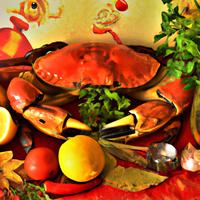
1 serving (100 grams) contains 97 calories, 20.1 grams of protein, 1.5 grams of fat, and 0.0 grams of carbohydrates.

Log this food in SnapCalorie

Nutrition Information
Calories |
231.0 | ||
|---|---|---|---|
% Daily Value* |
|||
| Total Fat | 3.6 g | 4% | |
| Saturated Fat | 0.5 g | 2% | |
| Polyunsaturated Fat | 0 g | ||
| Cholesterol | 126.2 mg | 42% | |
| Sodium | 697.6 mg | 30% | |
| Total Carbohydrates | 0 g | 0% | |
| Dietary Fiber | 0 g | 0% | |
| Sugars | 0 g | ||
| protein | 47.9 g | 95% | |
| Vitamin D | 0 mcg | 0% | |
| Calcium | 216.7 mg | 16% | |
| Iron | 1.9 mg | 10% | |
| Potassium | 616.7 mg | 13% | |
* Percent Daily Values are based on a 2,000 calorie diet. Your daily values may be higher or lower depending on your calorie needs.
Food Attributes
Source of Calories
About Whole crab
Whole crab is a flavorful seafood delicacy prized for its tender, sweet meat and vibrant culinary versatility. Found in cuisines worldwide, from Asian stir-fries to American seafood boils, crabs are commonly steamed, grilled, or baked to preserve their natural taste. Nutritionally, whole crab is an excellent source of high-quality protein, essential vitamins like B12, and minerals such as selenium, copper, and zinc, which contribute to immune function and overall health. Crabs are naturally low in fat and calories, making them a heart-healthy option when prepared without excessive butter or creamy sauces. However, sodium content can be high, especially in pre-seasoned or processed crab dishes, so mindful preparation is key. Additionally, the cholesterol levels in crab may be a concern for individuals managing specific dietary restrictions, though it is generally considered balanced in moderation. Whole crab offers a nutrient-packed, delicious centerpiece for a well-rounded diet.



